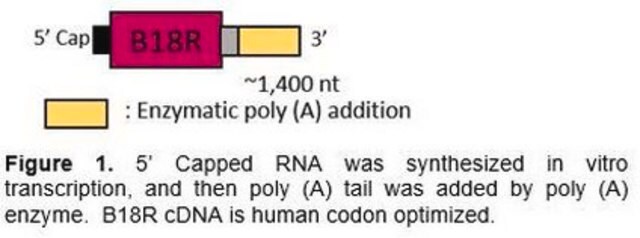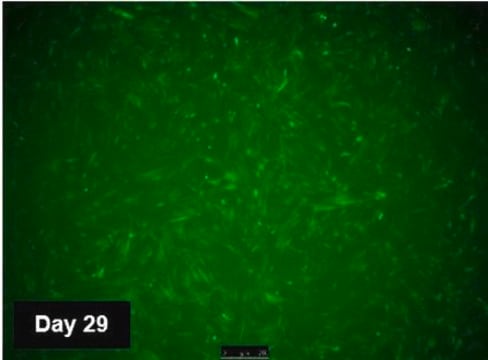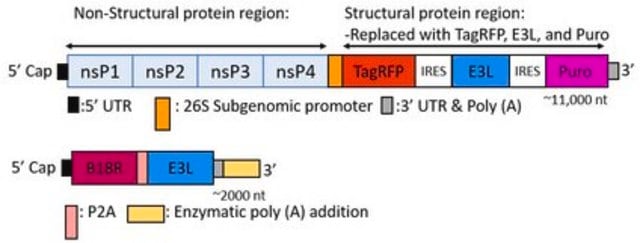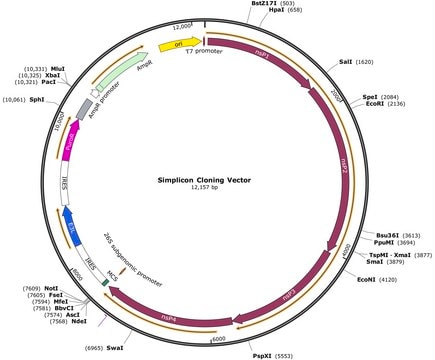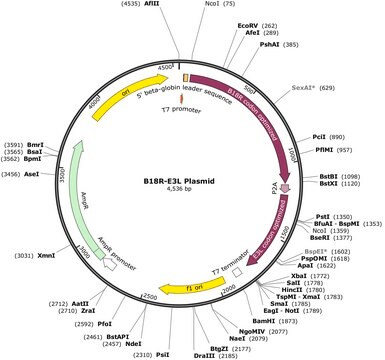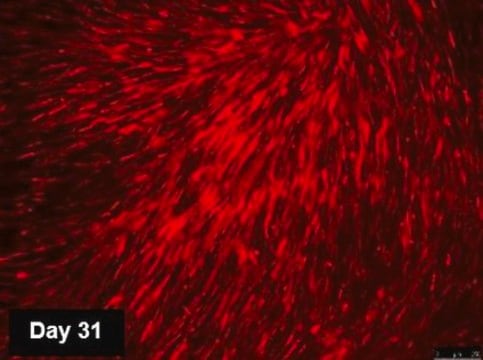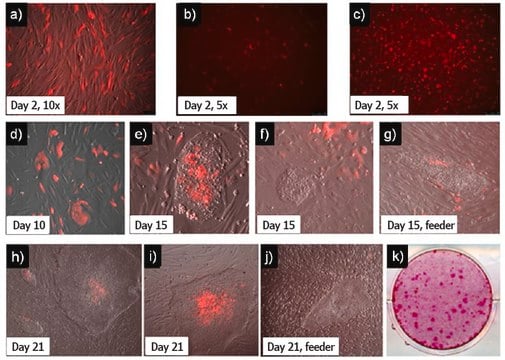SCR720
TagGFP2 Simplicon® RNA (E3L) Kit
To determine optimal transfection conditions to express the self-replicating RNA of your interest through using Simplicon® Cloning Vector (E3L) (Part #:SCR724) in hard-to- transfect somatic or primary cells
Synonyme(s) :
Self-replicating TagGFP2 RNA
Se connecterpour consulter vos tarifs contractuels et ceux de votre entreprise/organisme
About This Item
Code UNSPSC :
12352207
eCl@ss :
32161000
Nomenclature NACRES :
NA.81
Produits recommandés
Technique(s)
nucleic acid detection: suitable (RNA)
Conditions d'expédition
ambient
Description générale
Simplicon is a novel system to effect immediate high sustained protein expression of multiple genes into transfected cells without the risk of genome integration. The technology employs a single, synthetic, polycistronic, self-replicating RNA based on the Venezuelan equine encephalitis (VEE) genome1,2,3. The Simplicon RNA contains only genes encoding the VEE RNA replication machinery while the structural proteins that are required to make an infectious particle have been removed and replaced with the transgenes of interest.
Introduction and replication of the Simplicon RNA is expected to elicit a strong interferon response in transfected cells. To suppress the IFN responses, a Vaccinia virus protein4, B18R, is used for the original Simplicon technology. Recently, we found that another Vaccinia virus protein4, E3L, also suppresses the IFN responses in Simplicon RNA expression. B18R neutralizes type I interferons by direct binding, while E3L inhibits the cytoplasmic signaling pathways of IFN responses. Therefore, B18R and E3L are both employed in the Simplicon Expression System and work collaboratively to suppress IFN responses. As a result, there is increased cell viability during RNA transfection and increased expression of the transgenes. The Simplicon Expression System works in human cells and is not expected to work in mouse cells. This is because the B18R does not effectively neutralize mouse interferon (IFN)-β.
The TagGFP2 Simplicon RNA (E3L) Kit was developed to enable the evaluation of the Simplicon Expression System in targeted cells. E3L4 incorporation in Simplicon System strongly suppresses interferon responses and enables increased expression of the target gene(s). TagGFP2 Simplicon RNA expresses an improved variant of the Aequorea macrodactyla GFP-like protein. TagGFP2 exhibits bright green fluorescence comparable to that of EGFP, with excitation/emission maxima at 483/506 nm, respectively 5, 6.
Introduction and replication of the Simplicon RNA is expected to elicit a strong interferon response in transfected cells. To suppress the IFN responses, a Vaccinia virus protein4, B18R, is used for the original Simplicon technology. Recently, we found that another Vaccinia virus protein4, E3L, also suppresses the IFN responses in Simplicon RNA expression. B18R neutralizes type I interferons by direct binding, while E3L inhibits the cytoplasmic signaling pathways of IFN responses. Therefore, B18R and E3L are both employed in the Simplicon Expression System and work collaboratively to suppress IFN responses. As a result, there is increased cell viability during RNA transfection and increased expression of the transgenes. The Simplicon Expression System works in human cells and is not expected to work in mouse cells. This is because the B18R does not effectively neutralize mouse interferon (IFN)-β.
The TagGFP2 Simplicon RNA (E3L) Kit was developed to enable the evaluation of the Simplicon Expression System in targeted cells. E3L4 incorporation in Simplicon System strongly suppresses interferon responses and enables increased expression of the target gene(s). TagGFP2 Simplicon RNA expresses an improved variant of the Aequorea macrodactyla GFP-like protein. TagGFP2 exhibits bright green fluorescence comparable to that of EGFP, with excitation/emission maxima at 483/506 nm, respectively 5, 6.
Application
The Simplicon TagGFP2 RNA (E3L) Kit was developed to enable the evaluation of the Simplicon expression system in your cell line(s). For example, it may be used to determine optimal transfection conditions to express the self-replicating RNA of your interest through using Simplicon Cloning Vector (E3L) (Part #:SCR724) in hard-to- transfect somatic or primary cells.
To determine optimal transfection conditions to express the self-replicating RNA of your interest through using Simplicon Cloning Vector (E3L) (Part #:SCR724) in hard-to- transfect somatic or primary cells
Composants
1.TagGFP2 SimpliconRNA (E3L) (Part number: CS224549): One (1) vial containing 10 µL of RNA (1 µg/µL). Store at -80°C.
2.B18R-E3L RNA: (Part Number: CS224503) One (1) vial containing 10 µL of RNA (1 µg/µL). Store at -80°C.
2.B18R-E3L RNA: (Part Number: CS224503) One (1) vial containing 10 µL of RNA (1 µg/µL). Store at -80°C.
Qualité
•Discrete RNA band on RNA gel of appropriate size.
•40-60% GFP-positive human foreskin fibroblasts (HFFs) with FACS analysis.
•40-60% GFP-positive human foreskin fibroblasts (HFFs) with FACS analysis.
Stockage et stabilité
1.TagGFP2 SimpliconTM RNA (E3L) RNA: One (1) vial containing 10 µL of RNA (1 µg/µL). Store at -80°C.
2.B18R-E3L RNA: (Cat. # SCR727) One (1) vial containing 10 µL of RNA (1 µg/µL). Store at -80°C.
2.B18R-E3L RNA: (Cat. # SCR727) One (1) vial containing 10 µL of RNA (1 µg/µL). Store at -80°C.
Autres remarques
Concentration: Please refer to lot specific datasheet.
Informations légales
SIMPLICON is a registered trademark of Merck KGaA, Darmstadt, Germany
Clause de non-responsabilité
Unless otherwise stated in our catalog or other company documentation accompanying the product(s), our products are intended for research use only and are not to be used for any other purpose, which includes but is not limited to, unauthorized commercial uses, in vitro diagnostic uses, ex vivo or in vivo therapeutic uses or any type of consumption or application to humans or animals.
Code de la classe de stockage
12 - Non Combustible Liquids
Point d'éclair (°F)
Not applicable
Point d'éclair (°C)
Not applicable
Certificats d'analyse (COA)
Recherchez un Certificats d'analyse (COA) en saisissant le numéro de lot du produit. Les numéros de lot figurent sur l'étiquette du produit après les mots "Lot" ou "Batch".
Déjà en possession de ce produit ?
Retrouvez la documentation relative aux produits que vous avez récemment achetés dans la Bibliothèque de documents.
Notre équipe de scientifiques dispose d'une expérience dans tous les secteurs de la recherche, notamment en sciences de la vie, science des matériaux, synthèse chimique, chromatographie, analyse et dans de nombreux autres domaines..
Contacter notre Service technique